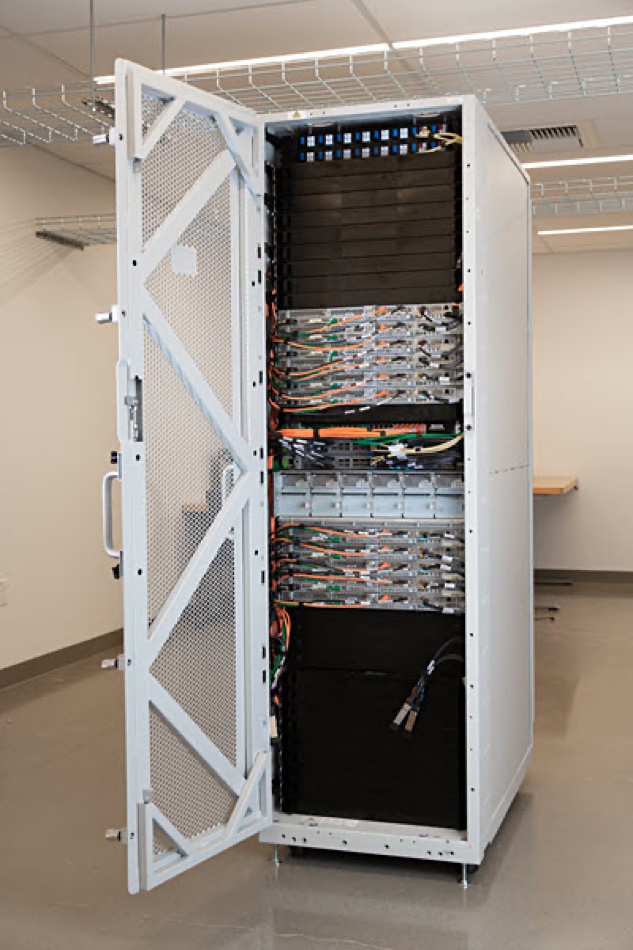Amazon late last year launched AWS Outposts, a fully managed service based on a converged infrastructure rack, including server, storage, networking, and AWS cloud software services. The appliance is integrated with the public AWS cloud for a consistent hybrid cloud AWS experience across the customer’s data centres and its AWS accounts.
We think there is an arguable case that AWS Outposts represents an existential threat to the on-premises part of the hybrid cloud storage and server market.
Let’s remind ourselves just how big AWS’s storage business is. Its $8bn annual revenues – according to William Blair analyst Jason Ader – make the company the world’s second biggest data storage biz, albeit half the size of the runaway market leader, Dell. For comparison this is $2.6bn more than NetApp’s fy20 revenues, almost twice HPE’s fiscal 2021 $4.56bn storage revenues, and more than four times IBM’s fiscal 2020 storage hardware business, and about five times Pure’s fiscal 2020 revenues of $1.643bn.
The rush to support AWS Outposts has been breathtaking, with multiple storage-centric vendors already certified by Amazon as AWS Outposts-ready. They include Clumio, Cohesity, Commvault, CTERA, Iguazio, Infinidat, NetApp, Redis Labs, Pure Storage, Qumulo and WekaIO.
Perhaps they have little choice. AWS’s market presence makes Outposts an enticing proposition (and far more so than Google’s competing Anthos or Microsoft’s partner-led Azure Stack offerings).
We polled a number of data storage vendors for their response and all, with one exception, think we are barking up the wrong tree.
To summarise the counter-argument, Outposts represents another opportunity for storage vendors to work with AWS and deliver better storage facilities to joint customers. Here are the views of three vendors.
Pure Storage
A Pure spokesperson said: “AWS Outposts is a validation of the importance of hybrid cloud in the enterprise. We have supported customers’ hybrid cloud environments with Cloud Block Store and now Portworx, tackling the most difficult piece of running in a hybrid or multi-cloud environment – providing consistent and portable data services.”

Pure argues that Outposts provides AWS customers a way to connect and deploy applications that run in their data centre or edge locations with parts of their applications that run in-region at AWS, and serving those applications with in-region services.
This simplifies application management and deployment, but for many edge applications that are data-intensive, have low-latency requirements at the edge, or have high-bandwidth requirements for data, there’s a need for much higher performance, enterprise-grade and reliable dedicated storage running at the edge with Outposts.
Pure’s spokesperson told us: “With FlashBlade, we can provide high-performance storage for analytics, AI, IOT and other typical Edge workloads. With FlashArray, we can provide the high-performance SAN needed for many of the traditional business applications that we serve today
“[Pure-owned] Portworx software is also an Outposts Ready solution, and provides customers running on Outposts compute, the enterprise-grade container storage services they need, but just as importantly the application and data-management workflows (backup, DR, migration) and portability they need.”
He said: “We see Outposts as another compute platform that our customers are choosing, one that is well-connected to in-cloud management and specifically targeted at edge workloads, and one where we are able to provide unique value. We have and continue to work closely with AWS as an Advanced Technology Partner to develop solutions for Outposts as well as other AWS service offerings.”
B&F notes Pure’s focus on AWS Outposts’ compute and not its storage facilities.
Panasas
For Panasas, AWS Outposts is competition but weak and poor competition.
AWS positions Outposts as being suitable for high performance computing (HPC). Panasas, which supplies HPC storage, disagrees.
Curtis Anderson, Software Architect at Panasas, told us: “This seems a bit disingenuous on their part. Sure, you can easily remove the wait times, just pay them more.” The same is true for an on-premises HPC system suffering long wait times; buy more kit.
“AWS Outposts are, by definition, built upon AWS’s infrastructure model. If HPC doesn’t work well in an AWS data centre, then HPC will not work well in an “Outpost” (very much smaller with fewer resources to call upon) of that data centre architecture that happens to be on-prem.”
He said: “The core part of the AWS architecture that gives them the “11 nine’s availability” they advertise is replicating your data to multiple “availability zones” and providing compute locally in those zones that can continue operations on that data if there’s a disruption in the primary AWS availability zone you use. Only snapshots of Outpost storage will be replicated to the local AWS Region, so the frequency of snapshots determines how much work you’ve lost and have to recreate in the event of a major outage. So, in essence, [there’s] no “11 nine’s availability” for an Outpost.
Anderson thinks Outposts HPC is akin to a reduced managed services contract: “where the vendor brings all the gear with the contract, but they’re not bringing a cloud with them. The customer gets HPC outcomes as pure OpEx, like regular AWS deployments, rather than a traditional managed services contract where there is CapEx to buy and OpEx to pay for ongoing management.“
Blocks & Files hasn’t found any other storage vendor who would say that AWS Outposts is an AWS attack on the on-premises data centre business, whereby AWS could hope to make inroads into their on-premises server, storage and networking business.
Infinidat
Infinidat didn’t really want to talk to us about AWS Outposts as a competitor. But the company has pointed us towards a statement by Robert Cancilla, EVP, Business Development & Global Alliances: “AWS has created the ability for enterprises to integrate with Infinidat’s storage more easily, for high performance and scalability at a lower cost. While AWS is bringing cloud operational models on-premises, Infinidat is complementing AWS Outposts with elastic pricing models that cloud users demand.”
AWS Outposts technology

AWS Outposts is available as a 42U rack that scales from one to 96 racks to create pools of compute and storage capacity.
AWS plan to launch Outpost appliance for small edge locations next year; 1U and 2U rack-mountable servers that provide local compute, storage and networking services. For example, the 2U form factor is suitable for standard 19-inch wide, 36-inch deep cabinets, and uses an Intel processor to provide up to 128 vCPUs, 512 GiB memory, and 8TB of local NVMe (all-flash) storage, with optional accelerators like AWS Inferentia or GPUs.
We’ve asked AWS if any software that runs as an instance in the AWS cloud could run in Outposts. It has yet to provide an answer. We think it will be yes.
AWS introduced several storage services last month at re:Invent 2020.
- Glacier automated tiering,
- Expanded FSx (File System) and EFS file services
- Cold volumes for EBS,
- Automated DataSync between S3, EFS, and FSX,
- S3 support for Outposts
In August the company announced Elastic Block Store (EBS) io2, a Block Express service that provides SAN facilities. October saw AWS announce that the EBS CSI driver now supports creating volumes on worker nodes running in AWS Outposts subnets. The EBS CSI driver makes it possible to provision, attach, and mount EBS volumes into Kubernetes pods. This release also includes support for io2 volume types.
In other words an Outposts system can host a SAN for use by the Outposts compute instances. There are coming all-flash edge location Outposts configurations.
A VMware variant of AWS Outposts will soon be available, delivering a fully managed VMware Software-Defined Data Centre (SDDC) on premises.








